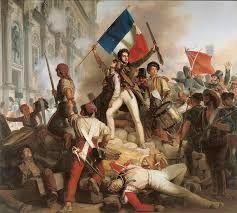
The Enlightenment and Revolutions
Quiz by Erica Isbell
Feel free to use or edit a copy
includes Teacher and Student dashboards
Measure skillsfrom any curriculum
Measure skills
from any curriculum
Tag the questions with any skills you have. Your dashboard will track each student's mastery of each skill.
With a free account, teachers can
- edit the questions
- save a copy for later
- start a class game
- automatically assign follow-up activities based on students’ scores
- assign as homework
- share a link with colleagues
- print as a bubble sheet
61 questions
Show answers
- Q1The Estates General was made up of three different groups. Which statement correctly describes the Third Estate?They were part of the 1% of France's populationThey paid the majority of the taxes to the governmentThey were educated French people and helped the destituteThey owned approximately 20% of the land300s
- Q2Which group of people were most often the victims of the Reign of Terror?the clergy who opposed Church reformsthe poor throughout the countrythe radicals in the governmentthe nobles who conspired against the state300s
- Q3All of the following were developments of the Congress of Vienna EXCEPT...Austria and a number of German states joined to form the German Confederation.Switzerland became an independent nation.Austria became the head of the most powerful alliance in Europe.The Kingdom of the Netherlands was created from former Dutch Republic and Hapsburg lands.300s
- Q4Which organization did Maximilien Robespierre lead that oversaw the horrors of the Reign of Terror?The National ConventionThe Committee of Public SafetyThe National AssemblyThe Directory300s
- Q5How did Napoleon Bonaparte become France's sole ruler?He was elected by the citizens of ParisHe was restored as a member of the royal familyHe seized control in a military takeover of the governmentHe was elected by the members of the National Convention.300s
- Q6Why did Napoleon decide to sell the Louisiana Territory to the United States?He reasoned that continuous attacks by Native Americans were making the territory unprofitable.He feared that the British would blockade the territory with their superior navyHe needed money to retake lands in the New World that he had lost in the French and Indian WarHe abandoned his dream of a New World empire after the revolt in Saint Domingue300s
- Q7After Napoleon's escape from Elba, many Frenchmen rallied behind the emperor because they feared that __________ would return lands to the nobilityLouis XVIIIWilliam XLouis XIVFrederick William III300s
- Q8What did Klemens von Metternich hope to achieve at the Congress of Vienna?to return Europe to the political state of affairs that had existed before the French Revolutionto reduce the power of the Pope so that the Italian states may unite in the futureto weaken Great Britain so that the country may be unable to wage war in the futureto politically isolate Austria so that the country may be unable to influence the development of Germany300s
- Q9Why did Nicolaus Copernicus wait until late in his life to publish his theory of a heliocentric universe?He feared criticism from politicians.He needed to be sure of his mathematical calculations.He risked punishment by church officials.He had little money to hire a printer of his work.300s
- Q10How did Newton explain the role of God in the universe?He believed God had little interest in the problems of humanity.He thought that God periodically punished humans who disobeyed him with disaster or disease.He believed God was periodically communicating with saints to reveal his purposeHe imagined God as a clockmaker who created an orderly universe and then left it alone.300s
- Q11Thomas Hobbes considered government to be an agreement, or _____________, between the ruler and the governed as long as the people’s liberties were limited.Social ContractLegal ContractDivine RightNatural Law300s
- Q12Based off of the image, what principle of the Enlightenment is demonstrated and who was it developed by?Separation of powers; MontesquieuSupremacy of the Executive; LockeSeparation of powers; VoltaireSupremacy of the legislature; Hobbes300s
- Q13Which concept is being illustrated by the following quote, "I may not agree with a word you have to say, but I will fight to my death for your right to say it".Freedom of ReligionFreedom of PetitionFreedom of AssemblyFreedom of Speech300s
- Q14What did John Locke and Thomas Jefferson believe the people should do if their government did not protect their natural rights?Appeal to the national religion to protect their natural rightsOverthrow their governmentChange their natural rightsPeacefully protest to a higher authority300s
- Q15Which of the following describes the goal of Enlightenment writers?Increase support for European military conquestsUphold the Divine Right TheoryLimit the government from interfering with the rights of the peopleSupport the European monarchs300s